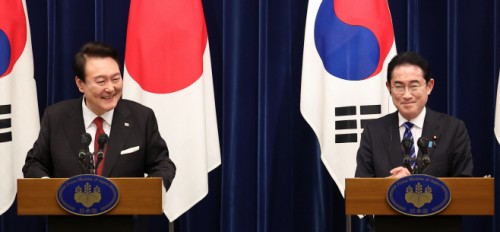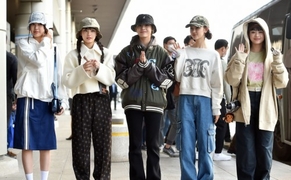 |
| President Yoon Suk-yeol and Japanese Prime Minister Fumio Kishida hold a joint press conference at the prime minister’s official residence in Tokyo on March 16, 2023./ Source: Yonhap |
AsiaToday reporter Lee Wook-jae
With the Korea-Japan summit meeting between President Yoon Suk-yeol and Japanese Prime Minister Fumio Kishida, expectations have risen for anew leap toward the future and the bilateral relations have reached a historic watershed.
Relations between the two countries, which had been on the verge of breaking off, changed completely with the 85-minute-long summit between the two leaders. Their pledge to establish a new partnership based on security and economy is expected to be a significant achievement in the diplomatic history of Korea and Japan.
According to the Presidential Office on Sunday, Yoon had a two-day trip to Japan, where he led consensus with the Japanese government to lift its unfriendly measures such as export restrictions and quickly restore all cooperation channels.
As a result of the summit, Korea’s export restrictions on three types of semiconductor materials were lifted after four years. The two leaders also agreed to completely normalize a military intelligence-sharing pact, better known as the General Security of Military Information Agreement (GSOMIA), which had been conditionally extended after conflicts during the Moon Jae-in administration. Shuttle diplomacy between the leaders has also resumed after 12 years.
With the restoration of strategic dialogue channels in various fields, expectations for a new future beyond the recovery of bilateral relations are rising.
Although the opposition party is launching an anti-Japanese campaign every day amid different views over the forced labor issue, the decision is an inevitable choice and historical calling of the Republic of Korea amid rapidly changing international order due to the Ukraine crisis and the strategic competition between the US and China. Thus, there are many voices that the results of the talks should not be returned. The restoration of bilateral relations between Seoul and Tokyo is becoming a key pillar for maintaining a peace regime on the Korean Peninsula and in Northeast Asia through the establishment of a security alliance among Korea, the US and Japan.
The fact that Yoon came up with a concrete solution as a leader on the tangled issue of compensation for forced labor is also evaluated as a significant achievement.
At the summit, the two leaders also agreed to restore channels for economic cooperation. With the establishment of the Economic Security Dialogue, they laid the foundation for cooperation on emerging and core technologies such as chips, batteries, and electric vehicles, and economic security issues.
The presidential office believes that it would strengthen supply chain cooperation with Japan, a key cooperation partner in the new economic security community, such as the Indo-Pacific Economic Framework (IPEF). It also expects there will be opportunities to expand joint R&D in new industries such as space, quantum, bio, and hydrogen reduction steel.
It is noteworthy that the two countries agreed to cooperate in the fields of finance and foreign exchange. Some are even discussing the possibility of restarting the Korea-Japan currency swap, which was suspended in 2015. Experts say that currency swaps can contribute to financial stability as the recent bankruptcy of Silicon Valley Bank (SVB) has heightened anxiety in the domestic foreign exchange market.
#Yoon Suk-yeol #Fumio Kishida #summit #relations
Copyright by Asiatoday
Most Read
-
1
-
2
-
3
-
4
-
5
-
6
-
7





















